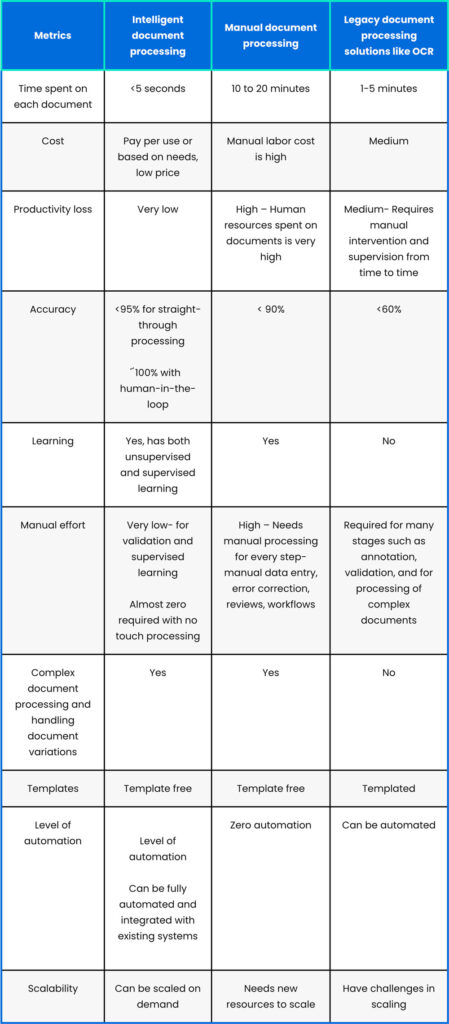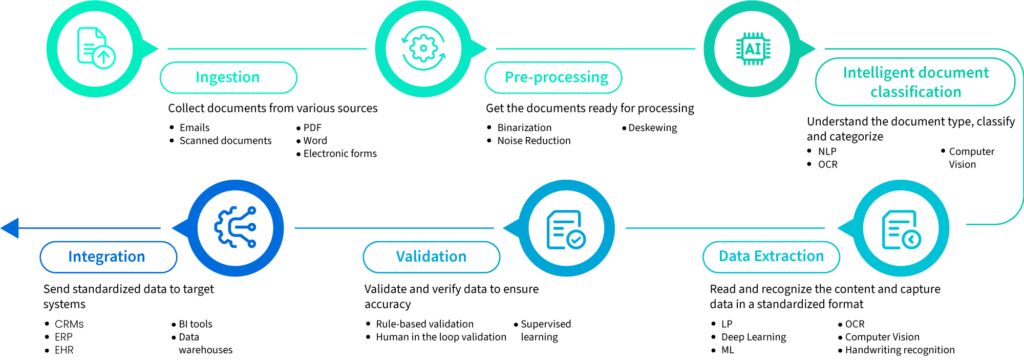
07 Aug The Benefits of an intelligent document processing System for Your Business
In many document-heavy industries, businesses spend around 35% of time and resources on data entry, error correction, and other document-related activities.
Intelligent document processing has revolutionized how businesses deal with raw unstructured data in complex documents. IDPs help businesses take advantage of data in complex documents, converting them to usable data for advanced analytics, decision-making, and gaining a competitive edge in the market.
What is intelligent document processing?
Intelligent document processing(IDP) uses advanced AI/ML models to capture data from documents and convert it into structured data formats for future processing. IDP solutions use technology like artificial intelligence, machine learning, computer vision, optical character recognition, and intelligent character recognition.
IDPs do not just extract data from documents, they use human-like intelligence to understand the documents and natural language recognition for context recognition. IDPs identify the document type, classify them and use the right algorithms to extract the data and convert it into the required format. In addition, they also use supervised or unsupervised learning to improve performance with every document. They go beyond simple OCR and help you do more with the documents.

How can your business benefit from an IDP system

Why is intelligent document processing better than other processing methods?

How IDP solutions solve industry-based document challenges
Insurance
The insurance industry is one of the sectors that primarily rely on documents in various forms in all departments. From customer onboarding to claims settlement, every stage requires data from multiple document types to make decisions. Manual processing can introduce errors, and cause delays which can lead to false assumptions, a longer time for claims settlement, and customer dissatisfaction. The time and cost required for manual document processing in different stages are very high. IDPs can help automate document workflows in the insurance industry and do faster, more accurate, and more reliable data processing with minimal or no human intervention. The common use cases for IDPs in insurance industries are for
Customer onboarding
When onboarding a new customer, there are many documents involved from policy forms and contracts to medical certificates and IDs. Manual processing can be extremely lengthy but with IDP solutions, you can complete the onboarding process in minutes.
Claims processing
Processing insurance claims involve documents like claim forms, supporting documents, certificates, and medical documents. Validation of insurance claims is also a major step in the process. IDPs can simplify the entire claims processing and validation stage.
Bulk data entry
At times of natural disasters or mishaps or in certain seasons, there might be many insurance claims coming all at once. IDPs can do bulk document processing and easily extract data from complex multipage documents and feed it to downstream systems.
KYC processing
Identity document processing is an important part of insurance policy and claims management. IDP solutions can process multiple kinds of IDs like driver’s licenses, passports, etc, and verify and validate the information.
Claims automation
IDPs can help automate document workflows in the insurance industry and do faster, more accurate, and more reliable data processing with minimal or no human intervention. This will help in faster claims settlements and increased customer satisfaction.
Invoice processing
Invoices play an important role in the insurance industry and are different from typical business invoices. Processing invoices is a crucial task in the insurance sector and IDPs can help insurance firms process invoices of different categories with high accuracy.
Mailroom automation
Insurance companies deal with thousands of emails every day and with mailroom automation, IDPs read, understand, and extract information from emails and attached files and feed them into the database.
Fraud detection
Fraudulent claims are a major challenge in the insurance industry. Fraud detection involves identifying anomalies in insurance documents and intelligent document processing software can validate data like signatures for fraud detection.
Data collation and analytics
The scale of documents processed in the insurance industry can be intimidating. Insurance industry deal with big data which can be leveraged for advanced analytics and decision-making. IDPs help convert data from complex documents to standardized formats and create centralized data repositories that can be used for analytics.
Risk profiling
In order to accurately assess the level of risk associated with insuring an individual or entity, insurance companies typically require a variety of documents that provide information about the applicant’s background, financial situation, and other relevant factors. IDPs can help in extracting valuable information from documents to conduct risk assessments and risk profiling.
Healthcare
Hospitals and other healthcare providers deal with a number of documents every day. Healthcare workers deal with physical documents and electronic records for multiple patients and processing speed and efficiency are of utmost importance for providing the best patient care. Automating some of the document processes and workflows with intelligent document processing can significantly save time and effort in healthcare. Compliance and privacy are also very important in the healthcare industry and IDPs help achieve security and compliance goals while helping to manage patient records efficiently. The common use cases for healthcare industries are,
Patient Registration and admission
Patient registration involves various documents from patient IDs, forms, previous health reports, questionnaires, etc. Automating the patient registration and admission process with IDP can significantly improve the wait time and ensure faster medical care. These can be also integrated with electronic referrals to increase the efficiency of healthcare services.
Patient health records management
Managing patient health records is challenging as these play a crucial role in treatments and later consulting. Most hospitals use EHR systems. Intelligent document processing solutions can easily digitize documents, extract data from different types of complex documents related to the patient such as forms, prescriptions, lab results, etc, and can be easily integrated with existing EHR systems.
Medical claims processing
Medical claims and insurance are other important aspects where documents play an important role. IDPs can help improve process efficiency in medical claims management and ensure fast and error-free document processing for bills, receipts, forms, and other supporting documents.
Employee onboarding automation
IDP can help automate employee onboarding by processing related documents, verifying and validating data, and saving time, resources, and cost.
Logistics
Logistics and supply chain management involve business operations such as warehousing, shipping, transportation, manufacturing, and distribution and freight forwarding involves billions of documents that come in a variety of formats. Extracting information and processing details in these documents is a costly, labor-intensive manual process, that can often lead to errors while recording and updating records within TMS or ERP systems. Some major IDP use cases in logistics are,
Shipping document processing
Shipping documents involve labels and instructions, waybills, dock receipts, and proof of delivery. These consist of different types of information and unstructured information such as phone numbers, zip codes, weights, and barcodes. IDPs can easily understand and extract information from complex documents.
Customs document automation
Logistics and freight forwarding companies use a lot of important documents such as the bill of lading, certificates of origin, and commercial Invoices. Companies use different formats for these documents and the lack of standardization is a problem when processing them. Intelligent document processing solutions use computer vision and advanced ML algorithms to process complex documents accurately the first time.
Digitise documents and automate workflows
Information storage and retrieval is difficult when you have tons of complex, non-standardized, information in paper documents. IDPs can help in digitizing and archiving documents into digital, searchable formats and help in automating document workflows to make faster deliveries, approvals, and payments.
Finance
Banks and financial institutions handle huge volumes of documents. Processing, authentication, and verification of documents are crucial and can lead to heavy workloads and inefficiencies when done manually. Intelligent document processing has revolutionized financial document management and assists in every step of banking processes from form data extraction to fraud detection. Some of the document use cases in banking are,
Banking forms and cheques
From account opening forms to cheques, banks process various documents that are confidential and important. IDPs help to securely digitize the data in these documents and improve operational efficiency.
Credit application automation
Digitizing documents and automating credit application workflows can help in speedier decision-making, faster credit approvals, and improved customer satisfaction.
Mortgage document
Mortgage processing involves verifying and validating a variety of documents including bank statements, purchase documents, balance sheets, tax refunds, payslips, ID proofs, etc. The entire process can be simplified with intelligent document processing solutions.
Real Estate
The real estate industry uses hefty documents often containing 100s of pages. These documents hold key information for investors and buyers. IDPs have several features like bulk document processing and document summarization which help in getting valuable insights faster. Some of the use cases in real estate that benefits from IDP are,
Lease agreements
Lease agreements are often lengthy documents and take up a lot of time to assess. Intelligent document processing solutions help in creating lease abstraction and summarizing the key information for the users.
Legal and contracts documents
Processing legal documents and contracts is an important part of real estate and IDPs can help in extracting key information for various purposes like risk assessment and contract lifecycle management.
Rent roll processing
Rent rolls help rental property investors boost income and performance. They provide important data, such as tenant turnover, occupancy rates, and rental income summaries, including expenses. Extracting and analyzing rent roll information can help investors make data-driven decisions.


